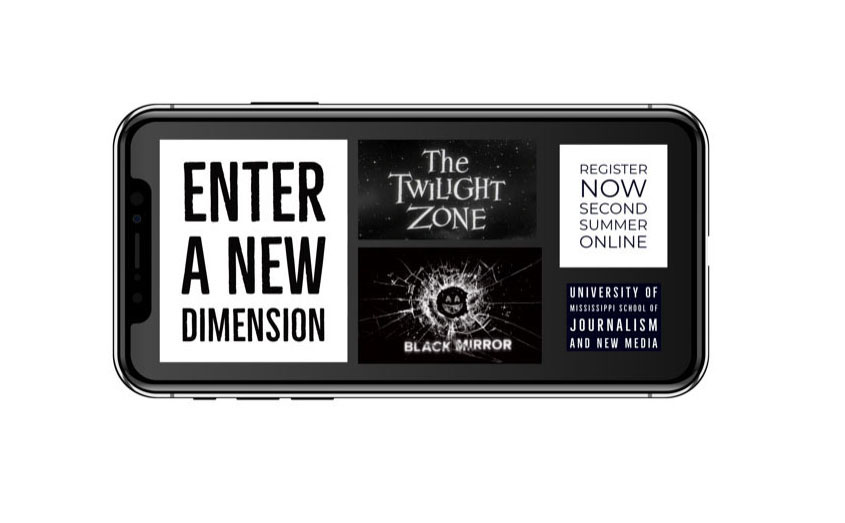Are you feeling a little bored? Why not get a head start on some of your classes?
Many courses offered this summer by the University of Mississippi School of Journalism and New Media are required classes for journalism and IMC majors.
For summer classes, you have until the day they start to enroll, so why not include learning in your plans for summer fun?
Full Summer
Bobby Steele – IMC 104 Web 1 – Introduction to Integrated Marketing Communication – Integrated marketing communications is a versatile field. This class required for IMC majors introduces the basic disciplines of IMC – advertising, sales promotion, public relations, direct marketing, database marketing, internet marketing communication, and relationship marketing.
IMC 395 – Internship I – Internship experience in media, such as public relations and advertising.
IMC 495 – Internship II – Internship experience in media, such as public relations and advertising.
First Summer Session
Mark Burson IMC – 455 Web 1 – Integrated Marketing Communications – This class required for IMC majors is a capstone course involving tactical application of IMC skills and disciplines that is designed to develop team-building skills. Alternative and competing IMC campaigns will be presented and judged by both professor and client.
Roy Frostenson – JOUR 101 Web 1 – Media, News & Audience – This class required of all majors is an introduction to various facets of communication from the world of news media to the persuasive realms of marketing, advertising, public relations, and social media. This course will also strengthen your knowledge of the media and communication industries, their history and current practices, their content, and their effects on us as individuals and society.

Creative Thinking
Emily Bowen-Moore – JOUR – 273 Web 1 – Creative Visual Thinking – Ready to think visual? This class required by all students except those enrolled in the broadcast journalism emphasis is an introduction to communication design that explores different media and how visual elements are used to communicate. It focuses on the vocabulary of effective visual presentation and the analysis of visual messages across media platforms.
Mark Dolan – JOUR 345 – Digital Media Diversity – Explores the origins, theory, and applications of diversity in digital media content and opens pathways among students and instructors to understand digital representations of race, sexuality, gender, disability, ethnicity, and class, underscoring and enlarging historical narratives of communication, the nature of audience and content creators within digital spaces. This class fulfills the diversity requirement.
Second Summer Session
Brad Conaway – JOUR – 310 Web 1 – Social Media in Society – This class takes a critical approach to understanding the relationship between society and social media. The course will explore the development of social media by situating them in broader social, political, historical, and business contexts. We will examine how the emergence of social media technologies are discussed, the ethical and legal challenges surrounding these technologies, and how social media affect various aspects of our lives including our social relationships, identity, privacy, and work.
LaReeca Rucker – JOUR – 361 Web 1 – Journalism Explorations I – Black Mirror, The Twilight Zone and Media – The British science-fiction anthology series “Black Mirror” is set in the near future explores the potential consequences of social media and future technology. Each episode has a different cast with a unique story and, like most science fiction, it offers a prophetic warning about what could happen if we lose control and allow technology to control us.
Some might say we are currently living in a “Black Mirror” moment. Recognizing the show’s potential as a discussion starter about modern and future media, students will watch specific episodes of “Black Mirror” and think critically about the program. Through class discussions and writing exercises, they will envision the future of social media and technology. Some selected content will be hosted on our Black Mirror Project website.
This mind-bending class will also analyze topical developments and news stories related to the impact of social media on society. Students will read academic articles that have been written about “Black Mirror” and “The Twilight Zone.” Other science and speculative fiction movies and television shows will be examined. We’ll speculate about what the future holds, good and bad, with media and technology. And we’ll discuss what we can learn about journalism and a free society from science fiction visions of dystopias.

Students who take this class will receive daily lesson plans on Blackboard with work they should complete before the following day. They may be asked to give short video presentations via Zoom, or to upload a video to YouTube so that other students can view their presentations. We also plan to have weekly, nationally-recognized speakers who can share their thoughts on the media and technology topics we discuss that will be broadcast in an optional live Zoom meeting or via video.
Students will be asked to complete some writing projects that could be featured on our “Black Mirror” website: https://blackmirrorideas.wordpress.com/ They will be asked to engage in discussions in our Blackboard Discussion Forum with their classmates. We’ll also use social media platforms, such as Twitter, to communicate on some assignments. And we will (optionally) explore virtual reality, so it might be a good idea to purchase some inexpensive ($10 or less) VR glasses.
Iveta Imre – JOUR 362 – Journalism Explorations II – Video Storytelling – Video storytelling is an essential skill whether you are going into film or TV, social media or advertising, PR or journalism, and the goal of this class is to give students a fundamental understanding of how to use video to tell a quality story. Students will learn to research, report, shoot, and edit short, focused video stories designed specifically for the web.
Imre said students will be doing fun projects, such as creating a silent movie for which they will edit a story only using visuals. They will also learn best practices for videos for social media. Students will experiment with video storytelling for TikTok. They will learn video and audio editing, and the class will culminate in creating a mini personal story or a mini documentary. At the end of the semester, they will have a class film festival with surprise awards for the best in show videos.
Bobby Steele – IMC 104 Web 1 – Introduction to Integrated Marketing Communication – This class required for IMC majors introduces the basic disciplines of IMC – advertising, sales promotion, public relations, direct marketing, database marketing, internet marketing communication, and relationship marketing.
Christina Sparks – IMC 304 Web 1 – Account Planning – This class required for IMC majors presents principles and practices of the account planning process to develop skills, insights and strategies to use in different methods of influencing consumers’ behavior. Students will hear real-world examples of the instructor’s time as an account planner at Ogilvy.
Account planning is the study of branding, positioning, research, analytics, insights, and measurements involved in the creation and evaluation of an advertising or communication campaign. Account planners are known as the voice of the consumer within agencies. They are the brand marketers, consumer experts, strategy developers, data analysts, program effectiveness measurers and general thinkers behind communications. Concepts learned in the course will be applied in a planning project.

Darren Sanefski – IMC 305 Web 1 – Visual Communication – This class required for the graphic design specialization emphasizes creation, utilization, and critique of visual components of IMC at professional levels. Students will learn basics of design software for IMC purposes and applications in print, online, and video, as well as packaging and retail environments.
Mike Tonos – IMC 390.1 – Advanced Writing: Integrated Marketing – This class required for IMC majors explores advanced writing in integrated marketing types of advertising; concepts of creativity, copy structure, and style; emphasis on creative thinking and clear, precise writing in preparation of advertising for print and broadcast media and copy for presentations and direct mail.
John Baker – IMC 404 – IMC Research – This class required for IMC majors explores the theory and practice of qualitative and quantitative research applied to multiple marketing and communications challenges and tasks.
August Intersession
Bobby Steele – IMC 104 Web 1 – Introduction to Integrated Marketing Communication – This class trequired for majors introduces the basic disciplines of IMC – advertising, sales promotion, public relations, direct marketing, database marketing, internet marketing communication, and relationship marketing.
Tags: cool classes, Ole Miss, Oxford, School of Journalism and New Media, University of Mississippi